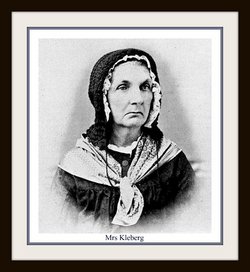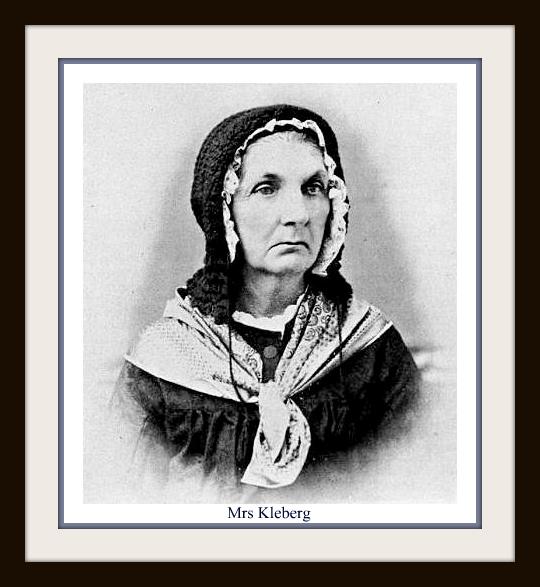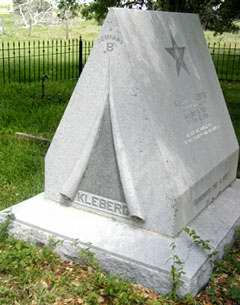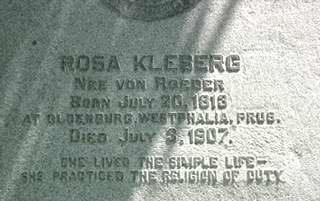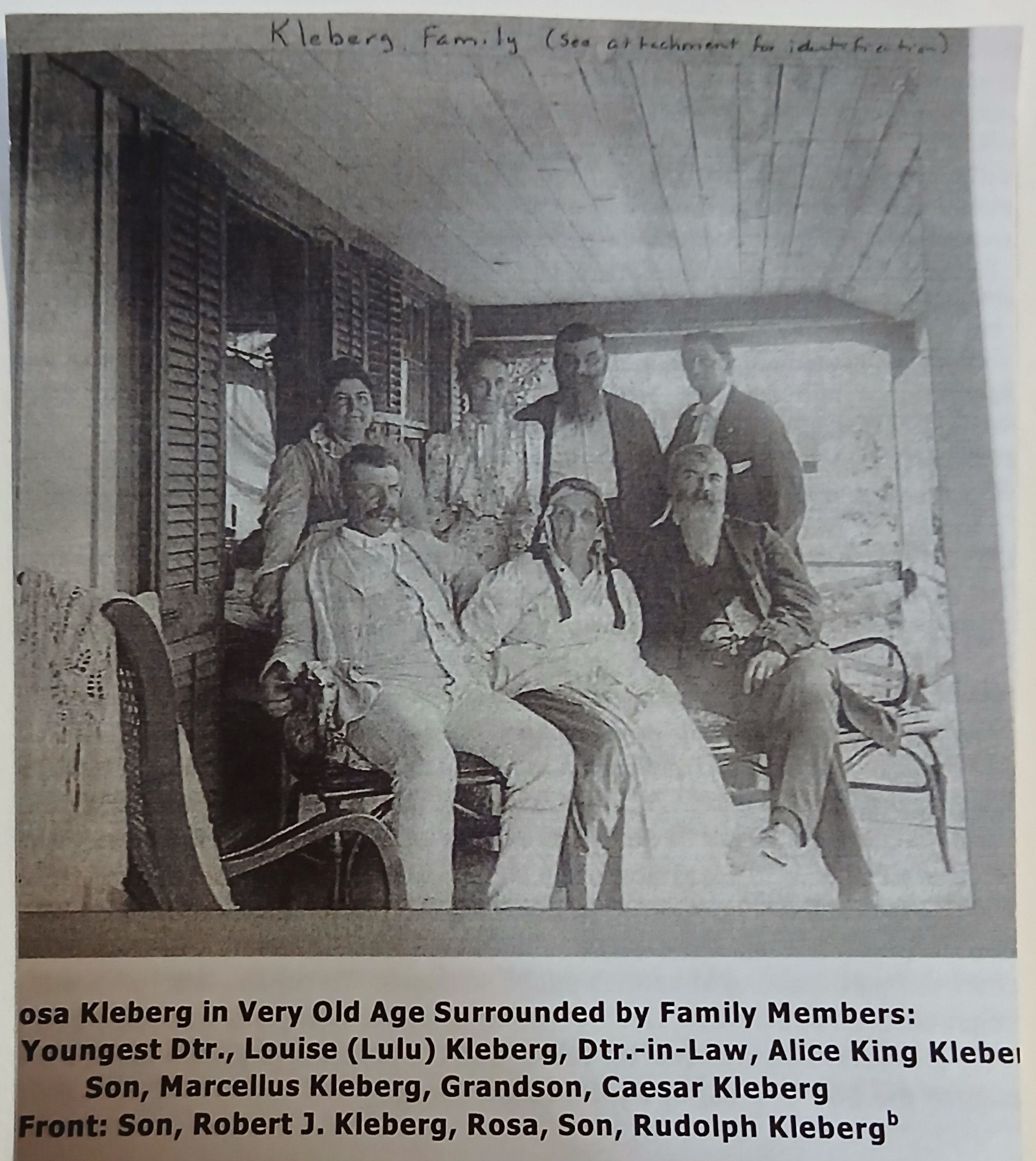Mrs. Kleberg's ability to adapt developed rapidly in Texas in response to repeated trauma: a shipwreck on Galveston Island, crude living conditions, the Texas Revolution, postwar unsettlement, and the deaths of family members. Within months of their settling at Cat Spring in Austin County, the revolution began. In the fall of 1835 Rosalie's brothers Albrecht and Louis von Roeder joined the army and fought in the siege of Bexar. Louis and Rosalie's husband Robert fought in the battle of San Jacinto while Rosalie fled with an infant child and other family members in the Runaway Scrape. When they returned they found that Mexicans had burned their homes and fences and most of their possessions. Rosalie recalled afterward that they were forced to start again with less than they had as new settlers.
When numbers of German immigrants began increasing following the war, Mrs. Kleberg showed sympathy to those, some sick and dying, who came by her home on the way farther west. One of her guests was Prince Carl of Solms-Braunfels, who requested coffee from her but refused to sit at the same table with others. She refers to him as a "conceited fool." Her dress, a youthful European stylishness in the 1830s, gave way to fashionless, functional attire, while her love for farming and country life moved her to build chicken houses like log cabins and to plant her garden in curved rows. In 1847 the Klebergs moved to Meyersville, DeWitt County, where they reared to maturity seven of their eight children, plus several nephews, grandchildren, and a foster son. Rosalie Kleberg survived her husband by twenty-seven years. She died on July 3, 1907, in Yorktown, Texas, and was buried on the Caroline and Robert C. Eckhardt ranch there. She was survived by three daughters and three sons, one of whom, Robert J. Kleberg, married Alice Gertrudis King and assumed management of the King Ranch on the Texas Gulf Coast.
BIBLIOGRAPHY:
John Henry Brown, Indian Wars and Pioneers of Texas (Austin: Daniell, 1880; reprod., Easley, South Carolina: Southern Historical Press, 1978). Ann Fears Crawford and Crystal Sasse Ragsdale, Women in Texas (Burnet, Texas: Eakin Press, 1982). Kleberg Family Papers, Dolph Briscoe Center for American History, University of Texas at Austin. Rosa Kleberg, "Some of My Early Experiences in Texas," trans. Rudolph Kleberg, Jr., Quarterly of the Texas State Historical Association 1, 2 (April, October 1898). Crystal Sasse Ragsdale, ed., The Golden Free Land: The Reminiscences and Letters of Women on an American Frontier (Austin: Landmark, 1976). Flora L. von Roeder, These Are the Generations (Houston: Baylor College of Medicine, 1978).
Mrs. Kleberg's ability to adapt developed rapidly in Texas in response to repeated trauma: a shipwreck on Galveston Island, crude living conditions, the Texas Revolution, postwar unsettlement, and the deaths of family members. Within months of their settling at Cat Spring in Austin County, the revolution began. In the fall of 1835 Rosalie's brothers Albrecht and Louis von Roeder joined the army and fought in the siege of Bexar. Louis and Rosalie's husband Robert fought in the battle of San Jacinto while Rosalie fled with an infant child and other family members in the Runaway Scrape. When they returned they found that Mexicans had burned their homes and fences and most of their possessions. Rosalie recalled afterward that they were forced to start again with less than they had as new settlers.
When numbers of German immigrants began increasing following the war, Mrs. Kleberg showed sympathy to those, some sick and dying, who came by her home on the way farther west. One of her guests was Prince Carl of Solms-Braunfels, who requested coffee from her but refused to sit at the same table with others. She refers to him as a "conceited fool." Her dress, a youthful European stylishness in the 1830s, gave way to fashionless, functional attire, while her love for farming and country life moved her to build chicken houses like log cabins and to plant her garden in curved rows. In 1847 the Klebergs moved to Meyersville, DeWitt County, where they reared to maturity seven of their eight children, plus several nephews, grandchildren, and a foster son. Rosalie Kleberg survived her husband by twenty-seven years. She died on July 3, 1907, in Yorktown, Texas, and was buried on the Caroline and Robert C. Eckhardt ranch there. She was survived by three daughters and three sons, one of whom, Robert J. Kleberg, married Alice Gertrudis King and assumed management of the King Ranch on the Texas Gulf Coast.
BIBLIOGRAPHY:
John Henry Brown, Indian Wars and Pioneers of Texas (Austin: Daniell, 1880; reprod., Easley, South Carolina: Southern Historical Press, 1978). Ann Fears Crawford and Crystal Sasse Ragsdale, Women in Texas (Burnet, Texas: Eakin Press, 1982). Kleberg Family Papers, Dolph Briscoe Center for American History, University of Texas at Austin. Rosa Kleberg, "Some of My Early Experiences in Texas," trans. Rudolph Kleberg, Jr., Quarterly of the Texas State Historical Association 1, 2 (April, October 1898). Crystal Sasse Ragsdale, ed., The Golden Free Land: The Reminiscences and Letters of Women on an American Frontier (Austin: Landmark, 1976). Flora L. von Roeder, These Are the Generations (Houston: Baylor College of Medicine, 1978).
Family Members
Sponsored by Ancestry
Advertisement
See more Kleberg or Von Roeder memorials in:
- Kleberg-Eckhardt Cemetery Kleberg or Von Roeder
- Yorktown Kleberg or Von Roeder
- DeWitt County Kleberg or Von Roeder
- Texas Kleberg or Von Roeder
- USA Kleberg or Von Roeder
- Find a Grave Kleberg or Von Roeder
Records on Ancestry
Advertisement
